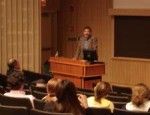Students: Stressed for Success?

Dr. Robert Vilas presented a lecture entitled, “Danger: The Pursuit of Success May Be Hazardous To Your Health!” on Wednesday at 7:00 p.m. in Love Auditorium.
Vilas discussed his experiences as a psychologist at Bowdoin College and as a parent in relation to the pressures placed upon both high school and college-level students in today’s society. He is currently a consulting and clinical psychologist in Maine and has worked at several prestigious colleges and universities, including Bowdoin College, University of Maine and Clarkson University.
Vilas cited a rise in the numbers of students who visited the counseling center at Bowdoin, as well as an increase in depression, suicide thoughts, substance abuse and addiction.
One of the factors contributing to the jump in reported cases of these problems is the fact that psychotherapy has been de-stigmatized in at least the last decade. However, Vilas believes that other factors, such as an increase in diversity in a new environment, fear or hysteria in parents and the question of balance play large roles in generating the stress that most college students experience on a semi-regular basis.
“It seems that a change in diversity may be a sort of culture shock for those [students] not from privileged communities,” said Vilas. “We are living in a culture of success…parents are highly anxious for their child’s future.”
With slides, he highlighted this idea of the culture of success, explaining how there are really two definitions of success: the first is that of attaining goals, while the second is the act of flourishing, or faring well. He believes that greater emphasis has been placed on the former definition, resulting in an overly goal-oriented society.
As a response to social pressures such as those mentioned above, Vilas suggests that students attempt to balance several factors, including acting based on one’s instincts or true self, concentrating on issues that have meaning rather than on credentials and accomplishing tasks out of passion for them, without anxiety.
Vilas mentioned how students seem to accomplish tasks in a compulsive manner.
“We have a battery-powered way of operating,” he said. Individuals often fall victim to Performance Fatigue Syndrome (PFS), including a perpetual task list, increasing judgment, and hard work which only leads to suffering.
While the beginning of the lecture was based on a presentation of PowerPoint slides, Vilas encouraged thoughts, comments and questions from the audience halfway through his presentation.
One student asked how to break the cycle of stress and pressure for success. Vilas explained that there are many choices to be made and that it is dependent of the level of engagement of the individual. He suggested taking time off, even taking a year off after high school, in order to gain some perspective on life.
“Peoples’ callings will come to them, be it through a random twist of fate or meeting someone,” said Vilas. “We must let go of things to which the ego has attached itself.”
Students were impressed by Vilas’ speech.
“I went to the lecture because lately, my friends and I have been questioning why we are at college. We feel unhappy and dissatisfied,” said first-year Emily Busch. “We feel like we should be doing something that is actually going to make a difference in the world, in people’s lives, instead of writing mundane papers and going out.”
Sophomore Megan Niziol had a similarly favorable reaction to the talk.
“I think the lecture was very applicable to Colgate and touched on issues of competitiveness that are always on the fringe but not really talked about by students,” she said. “I think that the first step to getting ourselves out of this super-competitive cycle…is for people to realize just how stressful and unrealistic our views about success are today.”
Vilas was the third speaker this semester sponsored by the Wellness Initiative, a new program on campus originally proposed by former Dean of the College Adam Weinberg. The initiative was made possible by a donation from alumnus Jay Shaw ’76 and his wife, Debi, in an effort to “establish healthy behavior patterns that extend beyond their time at college.”






